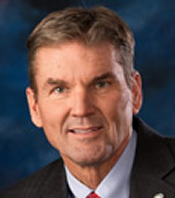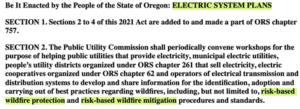Public Utility Commission’s Smoke and Mirror Tactics
 Oregon State Senator, Dennis Linthicum
Oregon State Senator, Dennis Linthicum
August 14, 2022
At the beginning of entrepreneur Vivek Ramaswamy’s book, Woke, Inc.: Inside Corporate America’s Social Justice Scam, Vivek relates a story about magic. He describes the art of distraction, sleight-of-hand, and deception. He links these smoke and mirror tactics to today’s version of woke capitalism and its vague, subjective, undefined, and unquantifiable progressive values that are advanced by stakeholders, at shareholder expense.
Vivek highlights that magic tricks consist of three parts. First, comes the Pledge, which is something you know and understand, like a deck of cards, a bunny or a girl. Second, comes the Turn, where something extraordinary happens to that which you know and understand, such as the bunny or the girl disappear. At this point people may gasp but there is no applause. The magician will need to bring the bunny or the girl back to get people cheering. This part is called the Prestige. The key to this discussion and what follows is there is no magic and there never has been any magic. The entire setup is a charade, sleight-of-hand, and trickery.
The same holds true in politics.
There is no magic that makes government spending better than private spending. There is no magic that makes government commissions and their assessments better than private party associations and their assessments. To wit, both may be biased in certain ways, but government power and funding has no parallel. To illustrate this point, think of the false claims regarding COVID, Global Warming, or inflation. Government has harnessed our tax dollars to further its own agenda with complete disregard for the citizens they are supposed to serve.
Here in Oregon, we can see the same large-scale charade taking place. Oregon’s Democrat legislators are simply keeping the con alive. They have amassed expansive power while keeping the game rolling along like a roulette wheel or magic show. However, their act is fast losing its “Prestige”.
This week my mailbox is filled with letters asking questions about SB 762. People want to know where it came from, how did it get passed, and what can be done about it?
For now, the so-called Wildfire Risk Assessment maps have been withdrawn by Oregon Department of Forestry (ODF) because they caused so much public outrage. But these maps are the least of our worries and they will be back, after all SB 762 was passed by legislators backed by the environmental left.
To set the stage, SB 762 was a 2021 Forest Policy bill requested by Governor Kate Brown and the Legislative Committee on Natural Resources and Wildfire Recovery. This committee chaired by Sen. Jeff Golden (D-Ashland) was formerly named the Environment and Natural Resource committee. I believe this committee was renamed to promote the illusion that wildfire is a concern for the environmental left and their legislative puppets.
This bill arose from Kate Brown’s unshakeable adherence to Rahm Emanuel’s advice, “You never want a serious crisis to go to waste. And what I mean by that is an opportunity to do things that you think you could not do before.” Many of these never-thought-of-before ideas are absurd on their face but others have been pushed into the public domain by heedless fear-mongering and traitorous promises by government experts.
SB 762, like most leftist legislation, fantasizes that more government rules will magically solve significant problems, like the mismanagement of our forests. SB 762 arose after several devastating wildfire seasons and became a focal point after seeing the horror from the 2018 Paradise, California fire.
In that tragedy a regional electric utility provider, Pacific Gas and Electric, had neglected maintenance and upgrades to their utility lines. This led to sparks in a heavily forested area and ignited fires during a high-wind event. More than 100 lives were tragically lost, and PG&E was quickly bankrupted.
The CA PUC approved a Chapter 11 bankruptcy plan that paid $5.4 billion in initial funds and 22.19% of PG&E stock into a trust for victims of wildfires caused by its outdated equipment. As of today, most lawsuits have been settled with $13.5 billion earmarked for more than 80,000 people who lost family members, homes, businesses and other property in the fires. Of course, this will never fully compensate for lost lives, memories, histories, or belongings.
Oregon’s Democrat super-majority, not wanting to let a crisis go to waste, strategized on how to use this as the starting place for loading the bureaucratic state with more power while stripping property rights and common-sense from families, land owners, municipalities and corporate entities. The Pledge starts the trickery by setting the focus on the Electrical System:

At its heart though, it is focused on the rural landscapes throughout Oregon, regardless of proximity to transmission lines or electrical substations. The key question is, how will risks be assessed? If the assessment comes from “science,” what “science” will be used and where will that “science” come from? What are the trade-offs between risk and reward? How would our state’s bureaucracies determine an entirely subjective assessment about “risk”? Risky to whom?
Can the state weigh your unique situation, individual circumstances and capabilities? How well did the state do on their risk-based assessments for your health under the COVID-19 debacle?
Corruption at the highest levels of government defies level-headed analysis. SB 762’s tax and spend political goal is aimed squarely at those living outside the metro, Democrat controlled, municipalities. Note, there is no risk-based analysis for sub-stations or transmission lines within the smoldering ruins of downtown Portland. In SB 762, we see political exploitation in deviously hidden ways.
When the legislature puts more demands on an agency, the agency typically needs more personnel, more office space, more computers and resources. SB 762 places 122 increased demands on state agencies, commissions, and contractual relationships. Some of these are quite complicated and others, less so, but they are easy enough to find by looking for “shall” clauses in the bill. Each of these is a demand which gets tagged onto each citizen’s share of the social contract, meaning you and I will fund them, regardless.

How much will this cost? What are the budgetary limits? ORS 477.060 spells out considerations in determining cost of protection for ODF which may “include the special or additional cost of fire protection for property owners within a forestland-urban interface classification, including the special or unique costs of assessment processing and administration.” Additionally, these “special or additional costs may not exceed $25 annually for each real property lot.”
However, this limitation has been struck with laser-like precision and ODF is not bound by any form of cost constraint. This means that the costs, regardless of how atrocious, will get passed onto property owners because ORS 477.270 stays in place and the cost for “providing protection for privately owned forestland shall be a lien upon such property.” This means ODF now has enormous financial incentive to exert its power as a proportional claim on your property.
Additionally, ORS 477.270 specifies, these fees “shall be levied and collected by the governing body with the next taxes on the land in the same manner and with the same interest, penalty and cost charges as apply to ad valorem property taxes in this state. The governing body shall instruct the proper officer to extend the amounts on the assessment roll in a separate account, and the procedure provided by law for the collection of taxes and delinquent taxes shall apply.”
In essence, what started as periodic workshops for utility grid providers ends up allowing ODF to place annual liens on every property in Oregon based upon some arbitrary risk-assessment and the supposed costs associated with providing fire protection. Landowners will also bear increased costs as private insurance providers get pulled into the one-size-fits-all maze of capricious rules and assessments.
This is why I continually argue that those running the Democrat super-majority are actively moving us toward socialism. They consistently pursue the expansion of the regulatory machine while limiting entrepreneurship, actively curtailing competition, and inhibiting private property rights. “You will own nothing and be happy” is part three of the con, the Prestige, the final result of their smoke and mirror magic.
Earlier I mentioned that your response and outrage caused the withdrawal of the original assessment maps. Stay vigilant as we work together to bring common-sense back to forestry management.
© 2022 Dennis Linthicum – All Rights Reserved
E-Mail Dennis Dennis Linthicum: d4linthicum@gmail.com